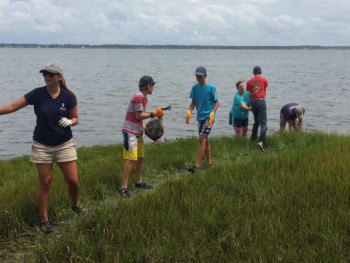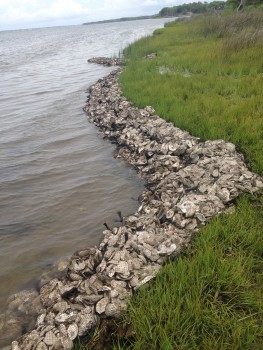Volunteers from the local community came out to Trinity Center in Pine Knoll Shores on Wednesday to help protect and restore our shorelines, one bag full of recycled oyster shells at a time.
In the muggy June air, volunteers of all ages formed a line, passing along bags of oyster shells to the edge of the shoreline to create a marsh toe revetment that will help reduce erosion and provide habitat. Staff and volunteers put down about 750 oyster bags along the shoreline to build 100 feet of the marsh toe revetment, which will eventually reach 500 feet.
For the past few years, the North Carolina Coastal Federation has partnered with Trinity Center and Sound to Sea staff to build living shorelines at the center’s property on Bogue Sound. These shorelines help decrease erosion, restore habitat and improve water quality. This particular project is funded by a grant from the National Oceanic and Atmospheric Administration (NOAA).
Living shorelines use marsh grass and oyster reefs to buffer the impact of waves, which allows shorelines to slowly build up while also creating valuable estuarine nursery habitat and food for animals. Eventually, sea creatures and oysters will come to live on the revetment, which will help filter and clean the water.
Healthy oyster reefs provide habitat for hundreds of sea animals, and one adult oyster can filter up to 50 gallons of water per day.
Debbie, a recurring federation volunteer, said she brought her sons to the oyster reef construction so they can get hands-on experience and learn more about water quality.
“It affects our food, our forests, our environment,” she said. “I want them to be educated about water quality and its importance.”
In 2014, the federation, Sound to Sea staff and volunteers completed an oyster shell bag sill off of Sanders Point, a worship area at Trinity Center.
The volunteers helped to build the revetment on Wednesday to the right of Sanders Point, near some of the center’s dormitory buildings.
Later in the day, volunteers and staff planted 1,450 plugs of smooth cordgrass, a salt marsh species, on the shoreline at Sanders Point in just half-an-hour. Smooth cordgrass helps hold sediment together, which reduces erosion, and it also helps filter water and provide habitat.
This oyster reef construction event was the first of about four, and Wednesday’s group of volunteers made great progress. The next event will be on June 15 at Trinity Center in Pine Knoll Shores from 10 a.m. to 2 p.m. Volunteers can register on our website.


